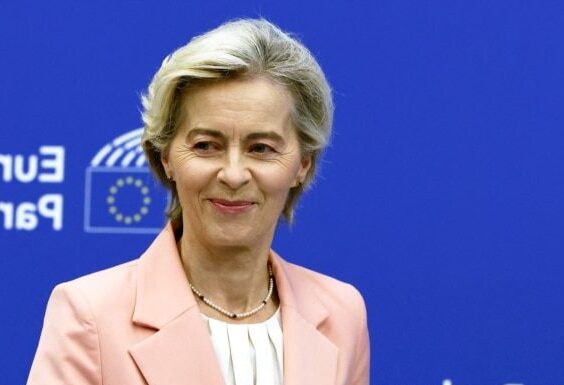BTN News: In a strategic move to strengthen the European Union’s policy direction, Ursula von der Leyen, President of the European Commission, unveiled key appointments for the 2024-2029 term. Among the notable names, Teresa Ribera, Spain’s current Minister for the Ecological Transition, will step into the powerful role of EU Antimonopoly Commissioner, succeeding Denmark’s Margrethe Vestager. The announcement comes as the EU prepares to address a rapidly changing global landscape, focusing on security, competitiveness, and climate transition.
The newly formed Commission, which comprises leaders from across the 27 EU member states, will take on critical portfolios aimed at bolstering the bloc’s economic and political power.
Teresa Ribera Takes Over EU Antitrust Policy
A New Era in Competition Law
Teresa Ribera, widely recognized for her leadership in climate policy, will oversee the EU’s competition regulations, taking on the antitrust commissioner role. Her appointment marks a pivotal moment, especially as the European Union intensifies its scrutiny of tech giants and foreign subsidies. Ribera is expected to build upon the legacy of her predecessor, Margrethe Vestager, who was instrumental in pushing for greater competition in the digital space, particularly in regulating platforms such as Google and Amazon.
One of the critical challenges Ribera will face is managing foreign subsidies that are distorting markets in Europe, notably in sectors like electric vehicles and energy production, where competition from China has become increasingly intense. With her background in climate action, Ribera’s appointment signals a strong push toward aligning economic competitiveness with green policies.
Kaja Kallas Appointed as EU’s Top Diplomat
Estonia’s Prime Minister Shifts to Foreign Affairs
In another prominent appointment, Kaja Kallas, Estonia’s Prime Minister, will become the European Union’s new High Representative for Foreign Affairs. Kallas is expected to bring her strong pro-Western stance and firm opposition to Russian aggression into her new role, at a time when the EU’s foreign policy remains heavily focused on the war in Ukraine. Her extensive experience dealing with cybersecurity threats and advocating for Eastern European defense aligns with the EU’s growing emphasis on security and digital resilience.
New Defense Commissioner to Bolster EU Military Capabilities
Andrius Kubilius Takes on Defense in Face of Russian Aggression
For the first time in its history, the European Commission has created the position of EU Defense Commissioner to consolidate military coordination across member states. The role will be filled by Andrius Kubilius from Lithuania, a clear sign that the EU is bolstering its defense capabilities in response to Russian aggression. Kubilius will focus on enhancing Europe’s military production and ensuring preparedness, particularly on the eastern flank, where tensions with Russia continue to escalate.
France and Slovakia Take On Key Economic Roles
Industrial and Trade Policies in the Spotlight
France’s Stéphane Séjourné will take charge of EU Industrial Strategy, tasked with driving the bloc’s efforts to strengthen its manufacturing base amid global competition. Meanwhile, Maros Sefcovic of Slovakia will oversee the EU’s Trade Policies, where he will navigate the complexities of global trade relations, with a particular focus on free trade agreements and balancing relations with major economies like the United States and China.
A Commission Ready to Face New Global Realities
Balancing Climate, Security, and Competitiveness
As Ursula von der Leyen embarks on her second term as President of the European Commission, the makeup of her new team reflects a shifting focus. While climate change remains a top priority, with the goal of building a decarbonized, circular economy, the new Commission faces unprecedented challenges in the realms of security and economic competitiveness. Von der Leyen highlighted these dual priorities in a recent statement, noting that the “war in Ukraine and global economic competition” have reshaped the EU’s strategic outlook.
The emphasis on competitiveness will be crucial as the EU continues its green transition, balancing sustainability with the need to remain a global economic powerhouse. In this context, the 2024 US Presidential Elections could have significant implications, particularly if a second term for Donald Trump results in a shift in US-EU relations, particularly regarding support for Ukraine and trade agreements.
Europe Prepares for a Year of Change
With the Commission expected to take office by the end of the year, all nominees must first undergo hearings in the European Parliament. These hearings will provide a platform for MEPs to assess the qualifications and policy directions of each nominee before they assume their critical roles in shaping the EU’s future.
The European Union stands at a crossroads, with economic, environmental, and geopolitical challenges that demand strategic leadership. The appointments of Ribera, Kallas, Kubilius, and others will play a vital role in steering the continent through an era marked by both crisis and opportunity.
Conclusion: Strong Leadership for a New European Era
The 2024 European Commission appointments underscore a commitment to securing Europe’s economic future, defending its borders, and leading the global fight against climate change. As this new leadership team prepares to take the reins, their success will hinge on their ability to address the complex, intertwined challenges facing the EU—from Russian aggression and global competition to advancing the green agenda. With Ribera, Kallas, and Kubilius at the helm of key portfolios, the EU is gearing up for a new era of strategic engagement on the world stage.


